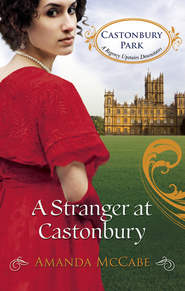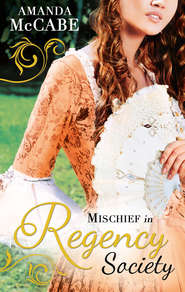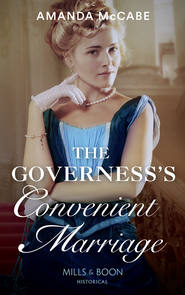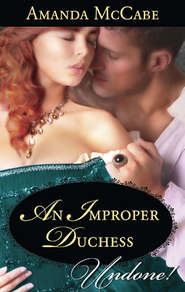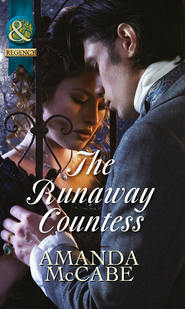По всем вопросам обращайтесь на: info@litportal.ru
(©) 2003-2025.
✖
A Regency Duchess's Awakening: The Shy Duchess / To Kiss a Count
Настройки чтения
Размер шрифта
Высота строк
Поля
“Not unless you count Lady Orman’s ballroom.”
“You were at a society ball?” Stephen said incredulously. “I’m all astonishment. You do need a brandy.”
“Yes, I do. Our sisters are always telling me I need to do my duty and marry, so I thought Lady Orman’s was a good place to start.”
“They don’t give a fig about your duty, Nick. They just have starry romance in their eyes since they married, and they want everyone to be the same. Especially us.”
“Hmm.” Nicholas took a deep, burning drink of his brandy. “Is that why you’re in town, then? To find a wife?”
“Good gad, no! I’m much too young to marry, though Charlotte says otherwise. I’m here to inspect a sale coming up at Tattersalls. A promising-sounding mare is in the catalogue, I hear. Though I dare say it was much the same at Lady Orman’s.”
Nicholas laughed, remembering the parade of giggling, white-clad débutantes and their mamas, so eager to meet an eligible young duke. And Emily Carroll, who seemed not at all interested in giggling, parading or eligible dukes.
“So it was,” he said. “I’d forgotten what the London Season was really like—a giant horse sale. I’ve been buried in the country too long.”
“You couldn’t help it. Father’s estates were in a bit of a mess after he died, and you had to set them right again. Not a simple task, and one I do not envy.”
“Well, I wish I was still in the country now,” Nicholas muttered.
“I was just there, and it’s not much better than town.
I stopped to see Charlotte and Drew at Derrington on my way to London.”
“And how is our sister?”
“Big as a house now, and anxious for the baby to arrive. But she had plenty of energy to prate at me about the marvels of marriage and domesticity! And she had two new pugs, as well. Four is too many, I say.”
“I shall be sane and avoid Derrington, then.”
“That would be wise, at least for now.” Stephen hesitated for a moment, then said, “Did you see no lady who caught your eye at the ball, then?”
Lady Emily’s green eyes flashed through his mind again, bright and full of laughter. Not cold at all. Nicholas shoved away the image and took another drink. “Never say you’re playing matchmaker, too, Stephen.”
“Of course not. I would be absolute rubbish at it. I just thought—well, it might be a good thing if you could find someone to help you. Someone sensible and kind. And pretty, of course.”
“What lady of sense would want to put up with our family? Your pranks would drive her away in no time.”
“I could control myself, and so could Charlotte and the others, if there was someone you wanted to impress. Someone you wanted to like us.”
“There is no one at present. But I will keep your words in mind.” And indeed he would. His sisters’ concerns he was accustomed to by now, but Stephen didn’t seem to notice such things. If he thought Nicholas needed “help” with his ducal work, his worries and loneliness must be showing.
That would never do at all. He never wanted to worry his family. Maybe if he did marry they would all be content for a while—until they found something else to fret about.
“We should go out tonight,” Nicholas said. “Since you’re in town so seldom, Stephen, you must make the most of it.”
“You’re not going to drag me to some stuffy ball or musicale, are you?”
“Not unless you have some terrible urge to go to Lady Arnold’s ball, no. We could go to the club, maybe, play some cards. Visit Mrs Larkin’s house, if you’re of the inclination.”
“Excellent! And I have tickets for a masked ball at Vauxhall, as well. I’ve heard that soprano Signora Rastrelli has a fine voice, and she’ll be performing there.”
“And a fine bosom, I would wager.”
Stephen laughed. “That, too.”
Soon after, Stephen departed for his own lodgings, since he refused to stay in Manning House, and Nicholas was left with his piles of ledgers and a brandy-induced headache. It was a good thing his brother was in town, he thought as he sat down behind the desk. Maybe what he needed was some fun, some distraction. Some drinking, a card game or two, some Italian opera singers with fine bosoms. He needed to feel like Nicholas again, and not just the duke.
But first, he did have to be that duke. He sorted through the thick stack of newly arrived invitations. The Season was winding down, yet that didn’t prevent one final, frantic flurry of parties before everyone scattered their separate ways. He laid aside the few he would accept, along with bills to see to and a letter from his estate manager at Scarnlea Abbey about repairs needed. Soon enough he would be there to see to them himself.
He opened the bottom drawer of the desk to reach for more writing paper, and in the dim depths he caught a glimpse of a small gold-and-enamel case. Its deep colours, red and blue and gold, lured him to reach for it.
Usually he could ignore its call, could leave it buried in the drawer, hidden from view behind paper and boxes of sealing wax. Today, though, some deep force compelled him to take it out, to hold it in his hand.
The metal quickly warmed in his clasp, and he stared down at it for a long moment before opening it. A woman’s painted pink smile greeted him, her brown eyes soft with welcome. In the miniature portrait, her dark hair fell loose over the shoulders of her red velvet gown, and she smiled eternally.
Valentina. His lost wife.
Nicholas gently stroked his thumb over the image, feeling only the roughness of the paint and no smooth, warm skin. She smiled back, always silent. In the much-too-brief time they knew each other, she was always laughing.
He put down the painting and buried his face in his hands as he remembered. He usually would not let himself think of her; it was long ago, and to remember was much too painful. But for some reason today she seemed near him.
He met Valentina Magnani on his Grand Tour, not long after his father and stepmother died and his stepbrother Brenner arrived to help them in their loss—the first time they met this son of Nicholas’s stepmother’s first, abandoned marriage. Nicholas was young then, barely out of university, and green as grass. Brenner thought a journey across the Continent, a time to learn more of his duties while still being largely free of them, would do him good.
And it had. At first he sorely missed his family, having never really been away from them before, but then the art and culture, the beauty of nature, enthralled him. They helped him heal from his loss, and he sent home many sculptures and paintings to adorn the ducal houses. He slowly started to find himself, who he might be apart from his family.
Then he came to Verona, Romeo and Juliet’s city—and met Valentina one day at the market as she did her family’s shopping. She was tall, honey-skinned, with satiny black hair and bright, dark eyes. She laughed at his clumsy attempts to speak Italian to the merchants, and helped him buy his fruit and bread. He was enchanted by her, by everything about her—her happy laughter, the glimpse of her red, ruffled petticoat at the hem of her brown skirt, the vivid, joyful life of her. She made him feel brought back to life, too.
He walked her home that day, carrying her basket for her, listening to her musical voice teach him more words of Italian, becoming more infatuated with every step. He met her mother, took tea with them. They were a respectable family of the city, her father an attorney, but they were decidedly not nobility. Not suitable duchess material.
Nicholas opened his eyes to stare blindly out at his library, the vast, dimly lit space, shadowed by soaring shelves of leather-bound books and crowded with heavy, old furniture. In the corners lurked statues from that voyage, pale marble gods and goddesses who stared back at him with their cold eyes. He had hoped to bring home more than art, more than freezing stone. He hoped to bring back life and laughter, a wife. A family.
His courtship of Valentina was quick, passionate. After all, he came from a line of people who gave all for the sake of love—his own blood ran just as hot, and he had never felt for anyone as he did for Valentina, either before or since. He craved her presence, her smile, her kiss, wanted to be with her all the time, and she felt the same for him. They went on long walks all over the city, kissing passionately in silent alleyways, in dusty museum galleries. He sat in her family’s drawing room and listened to her play the harp while her siblings ran around them.
Her home reminded him of his own at Welbourne Manor, where his brothers and sisters dashed about amid the ring of laughter. They would love Valentina, he knew, even if society wasn’t so accepting. They would help him make her happy even in grey, damp England, he was sure of that. So he married her in a little Verona chapel. He raised her lace veil and kissed her in the glow of stained glass, and had never been happier than in that one perfect moment.
Happiness was not to last, though. They went to a country villa for their honeymoon: long days of golden sun; warm, dusty nights of passion. Even before they returned to Verona, Valentina was pregnant. There could be no question of returning to England until she and the child could travel, so Nicholas waited to write to his family until he could announce both the marriage and the baby. Otherwise they would come rushing to him, and he wanted Valentina to himself awhile longer.
Thirteen months he was a husband, barely more than a year. One hour he was a father, to a tiny son who lived such a brief life. Then both the baby and Valentina were gone. The laughter and light were vanished as quickly as they began, and he was alone.
Well, not entirely alone. He had his family, his duty, his cursed title. After his wife and child were buried, he left Italy for home once again, his heart left behind under that cemetery cypress tree outside Verona, and he devoted himself to his family. He kept that brief marriage a secret, for he could not bear to speak of it, even to his sisters. He couldn’t bear the pity he would have seen in their eyes.
Over the years, the pain faded. He learned to cherish the memory of Valentina without despairing of what might have been. Only once in a while, on days like this, did he take out her portrait and try to imagine her near him again.
It became harder all the time. She moved further into the past. Yet a vivid fear remained, especially when he was told yet again he should do his duty, marry and produce children. How could he put another woman through the pain and fear Valentina suffered when their son was born, the agony when the baby died in her arms? How could he hurt a woman like that, watching her suffer and knowing it was his fault?
He would surely never love another as he had Valentina, but he would not marry without at least liking and respecting a lady. And he could not inflict that on someone he considered a friend.
Perhaps Stephen would marry, despite his protestations, and have children who could inherit the title. Yet that seemed unlikely. He was too busy with his racetrack scheme to consider a proper marriage.







